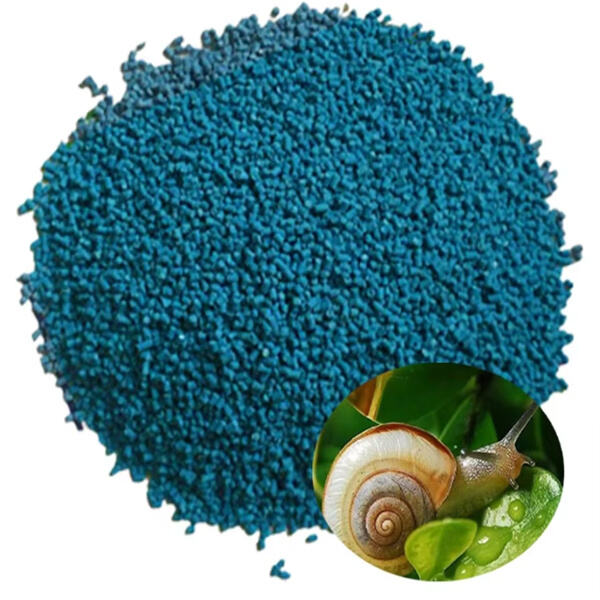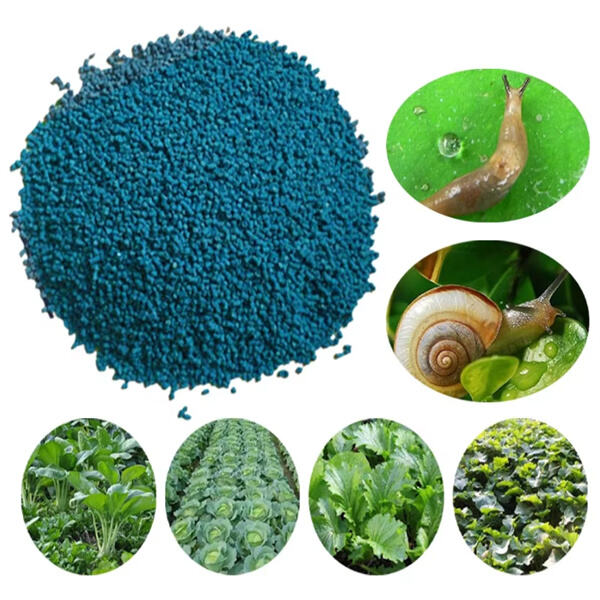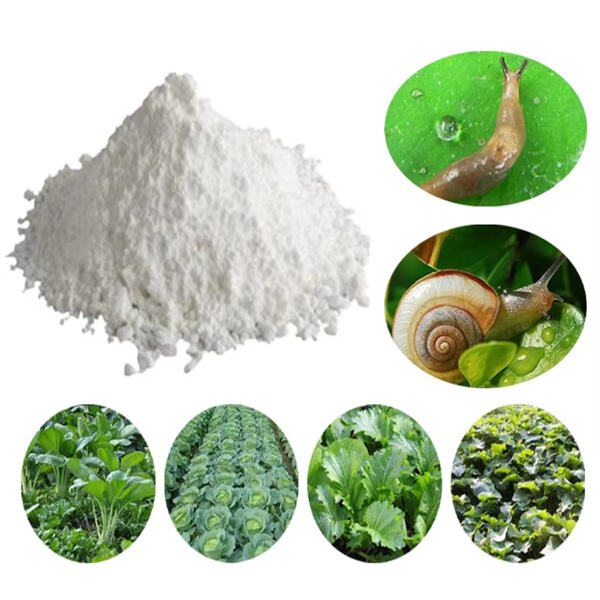Est-ce que nous avons tous entendu parler régulateur de croissance végétale ? Ce sont certains types spécifiques de produits chimiques que les humains utilisent dans leurs jardins comme agents anti-limaces et escargots. Le 30 juillet 2023, les limaces et les escargots sont l'une des plus grandes menaces pour la santé de vos plantes et cultures. Mais attention, la métaldéhyde est également toxique pour les animaux domestiques et la faune. Produits chimiques CIE à base de métaldéhyde — qu'est-ce que c'est, comment peuvent-ils être dangereux et quelles sont les options respectueuses de l'environnement pour avoir un jardin sain aujourd'hui.
La métaldéhyde est une substance chimique qui arrive généralement sous forme de granulés ou de liquide. Il s'agit d'un produit utilisé pour lutter contre les escargots et les limaces nuisibles dans les jardins, qui endommagent les plantes. Les jardiniers préfèrent souvent utiliser la métaldéhyde car elle est simple à utiliser et peut être assez efficace contre ces nuisibles. Mais il y a également un aspect plus grave lié à la métaldéhyde. Très toxique, ce qui signifie qu'elle peut nuire aux animaux domestiques, aux oiseaux et à d'autres petits animaux qui entreraient en contact avec elle.
Les humains sont généralement protégés contre le métaldéhyde, sauf s'ils en consomment de grandes quantités par accident. Bien que le métaldéhyde soit inoffensif pour les grands animaux, il peut provoquer de graves problèmes de santé chez les petits, comme les chats, les chiens, les oiseaux et les rongeurs, voire les tuer. Cela est dû au fait que le métaldéhyde est un neurotoxine qui agit sur le système nerveux. Il peut entraîner des conséquences très graves pour la santé, telles que des convulsions et des difficultés respiratoires.
Ces appâts au métaldéhyde doivent être dispersés par le jardinier sous forme de granulés ou de liquide là où des limaces ou escargots sont visibles, par exemple autour des plantes et des plates-bandes. Les appâts sentent bon pour de tels nuisibles et les attirent. Mais après qu'ils aient mangé le métaldéhyde, cela peut détruire leur système nerveux et finalement les tuer.

Les signes typiques d'un empoisonnement au métaldéhyde chez un animal incluent une salivation excessive, des frissons, des tremblements, des convulsions et/ou des difficultés à respirer. Si vous observez l'un de ces symptômes, il est nécessaire de consulter un vétérinaire immédiatement. Votre vétérinaire pourrait décider d'induire des vomissements pour éliminer tout poison résiduel de leur système ou administrer un médicament qui aide à contrebalancer les effets du toxique.

Heureusement, il existe des solutions respectueuses de l'environnement pour le contrôle des nuisibles, bien moins nocives pour les animaux domestiques et autres animaux sauvages. Vous pouvez utiliser des barrières naturelles, comme des murs faits de coquillages brisés ou de marc de café. Ainsi, l'utilisation de ces matériaux peut éloigner les nuisibles des cultures et des plantes sans recourir aux pesticides synthétiques.

Une autre alternative est une barrière en cuivre ou une bande recouverte de cuivre. Ce matériau protège le jardin des limaces en les électrisant légèrement pour les empêcher de s'approcher de vos plantes. Cette technique est sans danger pour les animaux domestiques et très efficace contre les limaces. Le compagnonnage est un autre terme pour la gestion des parasites dans un jardin. Il existe des plantes qui repoussent les parasites et d'autres qui attirent les insectes loin de vos plantes préférées.
Dans le monde de la CIE, vous trouverez une excellente fabrication d'agrochimiques et des services techniques, car nous nous concentrons sur les produits chimiques et la recherche de nouveaux produits pour les populations du monde. Au début du 21ème siècle, notre usine se concentrait uniquement sur les marques nationales. Après plusieurs années de développement, nous avons commencé à explorer les marchés internationaux, tels que l'Argentine, le Brésil, le Suriname, le Paraguay, le Pérou, l'Afrique, l'Asie du Sud, etc. En 2024, nous avons établi des relations commerciales avec des partenaires de plus de 39 pays. En même temps, nous serons déterminés à apporter davantage de bons produits dans encore plus de pays.
Shanghai CIE Chemical Co.,ltd. a été fondée le 28 novembre 2013. CIE se concentre sur les exportations de produits chimiques depuis environ 30 ans. En même temps, nous serons dévoués à apporter plus de bons produits dans plus de pays. De plus, notre usine a une capacité annuelle de production de glyphosate d'environ 100 000 tonnes et d'acétochlor d'environ 5 000 tonnes. De plus, nous collaborons également avec certaines entreprises multinationales pour produire du paraquat et de l'imidaclopride. Par conséquent, notre qualité est de classe mondiale. Actuellement, les formes galéniques que nous pouvons produire incluent SL, SC, OSC, OD, EC, EW, ULV, WDG, WSG, SG, G, etc. En même temps, notre département R&D s'engage toujours dans le développement de nouvelles formules pour produire certains produits chimiques mélangés selon les besoins du marché. De cette manière, l'efficacité de nos nouveaux produits peut répondre aux besoins des consommateurs finaux dans le monde entier. Nous considérons toujours cela comme notre responsabilité. De plus, jusqu'à présent, nous avons soutenu l'enregistrement de plus de 200 entreprises dans 30 pays dans le monde. En même temps, nous effectuons des rapports GLP pour certains produits.
Les produits pesticides que nous vendons sont conformes aux réglementations et normes nationales en vigueur. Nous assurons la fiabilité et la stabilité de la qualité des produits. 1. Conseil prévente : Nous offrons aux clients un service de conseil professionnel avant-vente pour répondre à leurs questions concernant l'utilisation, la dose, le stockage et d'autres problèmes relatifs aux vêtements et aux médicaments. Les clients peuvent obtenir notre aide par téléphone, e-mail ou consultation en ligne avant l'achat. 2. Formation après-vente : Nous organisons régulièrement des formations sur l'utilisation des pesticides, y compris leur utilisation correcte, les précautions à prendre, les mesures de protection, etc., afin d'améliorer les compétences et la sensibilisation des clients en matière d'utilisation des pesticides. 1/3 3. Visites après-vente : Nous effectuons des visites après-vente régulières auprès de nos clients pour comprendre leur utilisation et leur satisfaction, recueillir leurs avis et suggestions, et améliorer continuellement nos services.
1. Augmentation de la production : Les pesticides peuvent contrôler efficacement les ravageurs, les maladies et les mauvaises herbes, réduisant ainsi les niveaux de nuisibles, augmentant les rendements et assurant la sécurité alimentaire. 2. Économie de main-d'œuvre et de temps : L'utilisation de pesticides peut réduire les coûts en main-d'œuvre et en temps pour les agriculteurs, améliorant efficacement l'efficacité de la production agricole. 3. Garantie des bénéfices économiques : Les pesticides peuvent prévenir le SIDA, assurer les récoltes et apporter d'excellents bénéfices économiques dans la production agricole. 4. Assurer la sécurité et la qualité alimentaire : Les pesticides peuvent garantir la sécurité et la qualité des céréales et des aliments, éviter la survenue des épidémies et protéger la santé des populations.